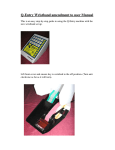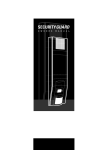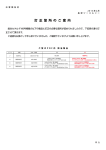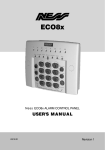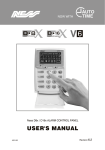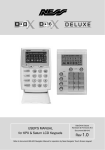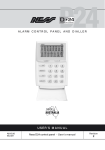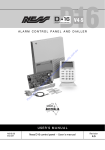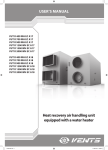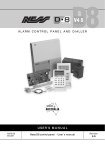Download securityGuarD iii user`s manual
Transcript
SecurityGuard III With Two Way Voice Monitoring Wireless Security System with GSM Monitoring & Two Way Voice Owner's Manual SECURITYGUARD III Main Unit Congratulations on selecting SECURITYGUARD III to protect your family and home. Your SECURITYGUARD III with its "speak easy" technology is a revolutionary radio based stateof-the-art alarm system which has been built to the highest standards of industrial design and manufacturing. The many sophisticated and innovative design features of the SECURITYGUARD III make the system highly secure as well as being easy to use. This Owner's Manual will help you identify the various parts of your SECURITYGUARD III system and give you an overview of operation and functions. Onboard siren / Speaker Siren and spoken voice prompts. GSM Dialler built-in. Rechargeable Main Battery (Internal). Scrolling LED Display Indicator LED One flash every 5 sec indicates normal operation. Control Buttons Left button Right button Adjust Main Volume - Press x 1 Main Volume 1 – 4 Adjust Bell Type - Press x 2 Bell Type 1 – 3 Adjust Bell Volume - Press x 3 Bell Volume 1 – 4 – OFF Onboard Motion Sensor (PIR) Emergency over-ride keyswitch 3 Operation Arm By Radio Key By Radio Keypad Valid button Press once. Low Battery +[User Code]+ press System is fully armed Home Mode (If enabled) By Radio Key By Radio Keypad Valid button Press twice. Low Battery +[User Code]+ press System is partially armed Home2 (If enabled) By Radio Key button Press 3 times. System is partially armed Disarm (or to reset alarms) By Radio Key By Radio Keypad Valid button Press once. Low Battery System is disarmed press [User Code]+ In these example house plans Armed areas are shown shaded 4 , Disarmed areas shown unshaded. Operation Panic Alarm By Radio Key By Radio Keypad Valid button Press & hold for 4 seconds. Alarm Low Battery Press both star keys together GSM Dialler to Monitoring Station Clearing Displays button Press once. To clear any display, press the Disarm button on a Radio Key. To recall the display press Disarm again, (unless the display has been reset by arming and disarming.) Emergency Over-ride Key Only to be used if your remote radio Keys are lost. Insert key and turn anticlockwise to disable the SECURITYGUARD III. (Store these keys in safe, hidden place). SECURITYGUARD III power off Turn the key anticlockwise. SECURITYGUARD III power on Turn the key clockwise. 5 Radio Key (RK4) Operation RK4 Radio Keys have four buttons for operating your SECURITYGUARD III. button to Disarm the system or to siPress the lence alarms. button to Arm the system or press Press the twice for HOME mode (if enabled on your system.) Press the button to sound the Panic alarm. button for auxiliary functions as proPress the grammed by your installer. Battery Replacement * Example device number Your RK4 Radio Keys are sealed units with an expected battery life of 10 years. Low battery warning might indicate a battery fault or the battery has been depleted by continuous presses. Contact Ness or your SGIII dealer for advice. Radio Keypad (RKP) Operation RKP Radio Keypads have a full PIN pad for operating your SECURITYGUARD III using 3 to 6 digit user codes. Your installer will set up and program the RKP to suit. Buttons Used with your user code to arm the system. Used with your user code to arm Home mode. Enter button, used when arming and disarming. (Press together) Sounds the Panic alarm. Not used. Used by your installer only. Lights Valid: Flashes once when a valid radio signal is sent to the Securityguard. Low Battery: If flashing indicates that the RKP's internal battery is low. Replace the battery. Battery Replacement * Example device number Carefully open the RKP Radio Keypad by pushing both tabs at the top of the unit using a flat-bladed screwdriver or blunt knife. Insert a new high energy Lithium 9V battery and then test the sensor. Insert the new high energy Lithium 9V battery. 6 Main Unit Battery LOW MAIN Battery (Battery Powered Systems) Your SECURITYGUARD III main battery will provide 3-4 month's operation before it must be recharged. When the "Low Main Battry" message is displayed you must charge the main battery. Plug the charger into a mains power outlet and plug the charging connector into the SECURITYGUARD III for 24 hours. Connect the charger for 24 hours. The red Indicator LED will be on while charging. Motion Sensors (PIR) Operation R15 PIR motion sensors can be added to the system to provide protection in additional rooms. Maximum detection range is 15m. Battery Saving Timer The PIR motion sensors have a unique battery saving feature which greatly extends battery life. The Battery Saving Timer conserves the PIR battery by preventing activation when it detects continuous motion, such as in a busy room during the day. Leave the room. Wait 5 minutes. Red light indicates motion sensed. The timer 'wakes' the PIR only when there has been no motion for 5 minutes. The PIR will ignore any motion if the timer has not expired. This is normal operation! To test a PIR, leave the room for at least 5 minutes and then re-enter. The red light in the PIR will flash to indicate that it has sensed your motion into the room. If you don't see the red light you may not have waited long enough - try again. PIR Battery Replacement * Example device number The PIR motion sensors use a high energy Lithium 9V battery. Carefully lift off the sensor's cover by unclipping at the bottom using a flat-bladed screwdriver or blunt knife. Insert a new high energy Lithium 9V battery and then test the sensor. Unclip cover at the bottom. Remove the cover. Insert the new high energy Lithium 9V battery. 7 Radio Door Bell (RDB) Operation Press the Door Bell button to sound the door chime at the SECURITYGUARD III main unit. Battery Replacement * Example device number Carefully lift off the RDB Door Bell unit's cover by unclipping at the bottom using a flat-bladed screwdriver or blunt knife. Insert a new CR2032 3V Lithium battery and then test the sensor. Positive (+) side up. Open here. Remove cover. The new battery must be inserted in the battery clip with the positive (+) side up. Insert the new battery. CR2032 3V Lithium battery. Radio Panic Button (RPB) Optional Operation Press the red Panic button to sound the Panic alarm. (As programmed by your installer.) Battery Replacement * Example device number Carefully lift off the Panic Button's cover by unclipping at the bottom using a flat-bladed screwdriver or blunt knife. Insert a new CR2477 3V Lithium battery and then test the sensor. Positive (+) side up. Open here. Remove cover. The new battery must be inserted in the battery clip with the positive (+) side up. Insert the new battery. CR2477 3V Lithium battery. 8 Radio Micro Reed Switch (RR3) Operation RR3 Radio Micro Reed Switches can be installed on windows and doors to detect opening. Battery Replacement * Example device number Positive (+) side up. Carefully lift off the reed switch cover by unclipping at the bottom using a flat-bladed screwdriver or blunt knife. Insert a new CR2032 3V Lithium battery and then test the reed switch. The new battery must be inserted in the battery clip with the positive (+) side up. RR3 Open here. Lift battery out. Insert the new battery. CR2032 3V Lithium battery. Universal Transmitter (RR2) Optional Operation Universal Transmitters can be used as window and door switches (same as Radio Reed Switches) or as a universal transmitter for other devices as connected by your installer. The RR2 also has an onboard vibration analyser with sensitivity adjustment. This allows optional Nessensor™ vibration sensors to provide wireless protection of door and window frames, works of art, jewellery cases, safes and other valuables. Battery Replacement * Example device number Carefully lift off the Universal Transmitter cover by unclipping at the bottom using a flat-bladed screwdriver or blunt knife. A warning sound will be heard when opening the case - this is normal. Insert a new high capacity Lithium 9V battery and then test the transmitter. Open here. Remove the cover. Insert the new high energy Lithium 9V battery. 9 Radio Smoke Detector Operation The SECURITYGUARD III Radio Smoke Detector (RSM) is a photoelectric smoke detector and on-board radio transmitter are powered by a single 9V Lithium battery (supplied). Alarm signals are delayed by 10 seconds before being sent to allow the on-board sounder to be tested without triggering the alarm system. Testing To test the sounder press and hold the Test button for at least 2 seconds. If you hold the Test button for longer than 10 seconds it will also send an alarm signal to the SECURITYGUARD III. Battery Replacement * Example device number Remove the detector from its base by twisting anticlockwise. Replace the battery with a high energy Lithium 9V battery. Make sure the red safety bar in the battery compartment folds down under the new battery. The safety bar ensures that the smoke detector cannot be connected to the base without the battery fitted. Twist off. Insert the new high energy Lithium 9V battery. To replace the detector on the base, line up the slot on the detector with the alignment arrow on the base and twist the detector clockwise to lock it in. Test the smoke detector. NOTICE The RSM radio smoke detector is intended for use as an optional and supplementary smoke detection system in addition to existing smoke alarms as required by relevant building codes. If there is any doubt as to the suitability of this device for a particular application it is recommended that you seek advice from the appropriate authorities or professional fire protection services. Radio Siren Operation The Radio Siren may be installed inside the premises to provide an extra loud noise deterrent in the event of an alarm. The Radio Siren is powered by a plug pack which must always remain on at the power point. 10 Back-To-Base Monitoring GSM Dialler Two Way Voice Your SECURITYGUARD III has a GSM Dialler which communicates with you or your monitoring station using the GSM mobile telephone network. This means you don't need a telephone landline for monitoring. Your SECURITYGUARD III has Two Way Voice capabilities which means that in the event of an alarm you can listen in and talk back to the premises through the SECURITYGUARD III. This allows you to verify alarm calls from any phone, anywhere you are. The dialler is setup and programmed by your installer at the time of installation. It does not need any maintenance but should be tested when you perform your regular system test. In the event of an alarm, SECURITYGUARD III can send SMS alerts to your mobile phone and you can even arm and disarm SECURITYGUARD III remotely from your mobile phone. GSM monitoring needs an active mobile phone SIM card to operate. Central station monitoring also requires a monitoring account with a monitoring company. Monitoring Options Your Mobile Phone Monitoring Station 24 hour monitoring by a central monitoring station. Self monitoring by SMS to your mobile phone with a two way voice channel. SMS text alerts ARE YOU OK? Two Way Voice Wireless communication to central monitoring station via GSM. 11 SECURITYGUARD III Battery Specifications Model Battery SECURITYGUARD III Main Unit 12V 3Ah Sealed Lead Acid (Gel) Battery Radio Key - 4 button Sealed housing, not user serviceable Radio Keypad High energy Lithium 9V battery* R15 PIR Motion Sensor High energy Lithium 9V battery* Radio Smoke Detector High energy Lithium 9V battery* Radio Panic Button CR2477 3V Lithium battery RR3 Radio Reed Switch CR2032 3V Lithium battery RR2 Universal Transmitter High energy Lithium 9V battery* RDB Radio Door Bell CR2032 3V Lithium battery * Use only high energy Lithium 9V batteries. Carbon or alkaline batteries are not recommended. Made In Australia by: SECURITYGUARD III User's Manual For the products 106-285 & 106-286 SGIII GSM + Voice models Rev2 Sep 2011 Document part number 890-410 Photographs are used for illustrative purposes only. Design and specifications may vary. Ness Corporation manufacturing processes are accredited to ISO9001 quality standards and all possible care and diligence has been applied during manufacture to ensure the reliable operation of this product. However there are various external factors that may impede or restrict the operation of this product in accordance with the product’s specification. These factors include, but are not limited to: 1. Erratic or reduced radio range. Ness radio products are sophisticated low power devices, however the presence of in-band radio signals, high power transmissions or interference caused by electrical appliances such as wireless routers, cordless phones, computers, TVs and other electronic devices may reduce the range performance. While such occurrences are unusual, they are possible. In this case it may be necessary to either increase the physical separation between the Ness receiver and other devices or if possible change the radio frequency or channel of the other devices. 2. Unauthorised tampering, physical damage, electrical interruptions such as mains failure, electrical spikes or lightning. Copyright Notice All rights reserved. No part of this publication may be reproduced, transmitted or stored in a retrieval system in any form or by any means, electronic, mechanical, photocopying, recording, or otherwise, without the prior written permission of Ness. Ness reserves the right to make changes to features and specifications at any time without prior notification in the interest of ongoing product development and improvement. © 2011 Ness Corporation Pty Ltd ABN 28 069 984 372












